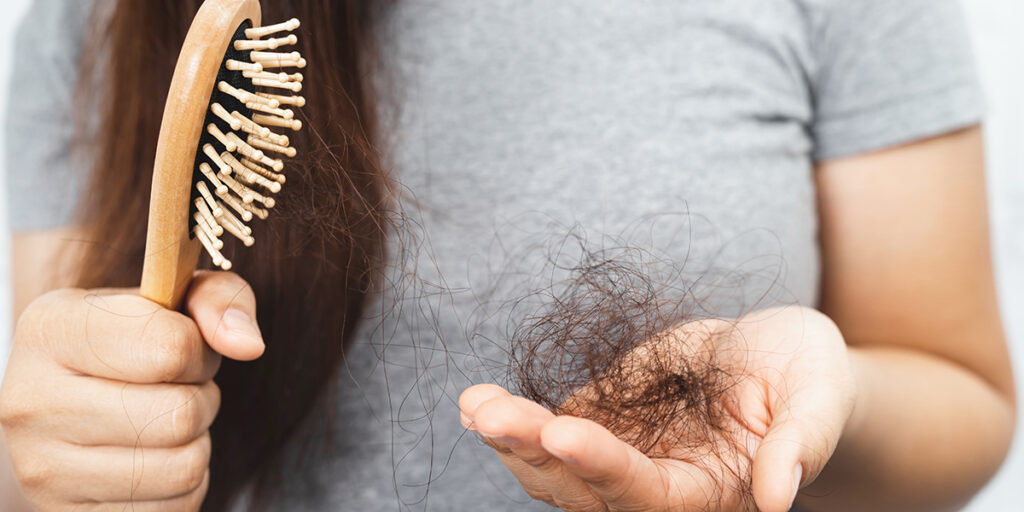The Importance of the HPV Vaccine: Protecting Yourself and Others Against the Virus
Human papillomavirus (HPV) is a widespread virus, with approximately 14 million new infections in the

Did you know that some sexually transmitted diseases (STDs) can cause hair loss? As common as STDs are, many people don’t understand the full scope of symptoms that you may experience. Society stigmatizes STDs, creating a general lack of education and support.
It’s no wonder that so many people search online about the question, “Can an STD cause hair loss?” Below, our team at Rapid STD Testing, a same-day STD testing provider, will share lots of interesting information you should know about the hair loss STD symptom.
Not all sexually transmitted diseases lead to hair loss, though a few do. So what STD causes hair loss?
Syphilis is an infection that progresses through the body in two stages. Common symptoms for syphilis in the first stage include sores forming around the mouth or genital region. In the second phase, rashes may spread to larger portions of the body.
Secondary syphilis can affect your scalp and cause hair loss when untreated. Alopecia causes your immune system to attack your hair follicles, resulting in hair loss. Syphilitic alopecia does not always occur, though it can happen, resulting in temporary hair loss that makes the scalp appear patchy.
Often, medical professionals mistake syphilitic alopecia for other hair-loss-causing medical conditions. If you suspect you may have syphilis, inform your doctor about any rashes or sores. Untreated syphilis can develop into fatal complications, affecting the nervous system, brain, and heart.
Antibiotics are the most common treatment for primary, secondary, or early latent stages of syphilis. Expedient treatments can cure syphilis and help you resume your hair growth in a few months.
Human Immunodeficiency Virus (HIV) is another STD that causes hair loss. HIV is a virus that damages your immune system’s ability to fight off infections.
In the beginning, HIV may feel like a common cold, often causing a sore throat or fever. When left untreated, HIV may develop into Acquired Immunodeficiency Syndrome (AIDS) or other opportunistic infections.
HIV does not directly result in hair loss, though it places you at a higher risk of contracting an illness that does. Such conditions include Telogen Effluvium (TE), thyroid dysfunction, iron deficiency, anemia, and diffuse alopecia.
Without treatment, HIV can develop into severe and fatal conditions. You should regularly test for STDs, especially if you have symptoms, so that you can get ahead on treatments before your situation escalates. With Rapid STD Testing, you can easily order a rapid STD test online.
Many people overlook the hair-loss effects of medications for STDs. While the diseases may cause symptoms, the medicines can also lead to frustrating complications.
STD treatments for HIV, gonorrhea, chlamydia, and herpes may cause temporary hair loss. After completing treatment, your hair should return to normal.
If you feel concerned about losing your hair from an STD treatment, remember that your health is essential to living a long and happy life. Hair can always grow back.
You should feel no shame or embarrassment about having an STD, though thinning or balding hair can make you feel insecure.
If you already have an STD, adequate treatment can reverse your hair loss. You can return to normal hair growth for syphilis or HIV-related immune system conditions after entirely healing your immune system. Occasionally, you may need to shed all pre-STD hair before anything new grows.
After contracting an STD, you cannot avoid hair loss entirely, whether from the disease itself or the treatment. Instead, you can only prevent hair loss from happening by not contracting an STD.
STD hair loss prevention methods include:
While you cannot always avoid contracting an STD, you can use the above methods to keep yourself safe. If you learn that you have an STD, you should immediately see your doctor to discuss your next steps.
Can an STD cause hair loss? Yes, though many different conditions can also make you lose your hair.
So what else causes hair loss?
Getting tested for an STD can help you identify the cause of your hair loss. At Rapid STD Testing, we want to help you learn more about STD symptoms and options for testing so that you can get ahead on treatment.
Can an STD cause hair loss? Yes. Can you prevent hair loss from occurring? Yes.
Get tested today so that you can treat your STD before losing any hair. You can order tests online with Rapid STD Testing. Call us at (866) 872-1888 to learn more.

No embarrassing exams, long waiting lines, or multiple visits. Just a quick lab visit for fast results.
Discover a lifestyle-focused approach to quality content at RapidSTDtesting.com. Unlike others, we don't rely on gimmicks or fabricated data to lure visitors. Our commitment goes beyond clicks – we're dedicated to answering the questions you search for online. With a team comprising medical experts and content specialists, our articles are meticulously crafted to promote STD testing, educate, and dismantle social stigmas.
Embrace a confidential atmosphere with our private testing options, ensuring your privacy is paramount. Every article is meticulously fact-checked and approved by medical advisors, guaranteeing accuracy and reliability. Our team, comprised of doctors and medical professionals, ensures that each piece of content serves a purpose – to inform, educate, and promote awareness.
Join us as we bridge the gap between medical expertise and lifestyle choices. RapidSTDtesting.com is your trusted source for informative, medically vetted content.